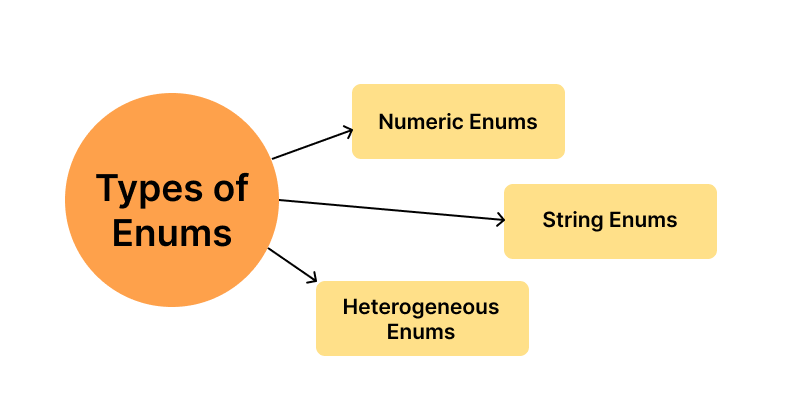
Enums, short for "enumerations," are a special data type in TypeScript (the language Angular uses) that allows you to define a set of named constants. These constants can represent a fixed set of values, making your code more readable and easier to manage.
What Are Enums?

An enum is like a group of related constants that are given names. Instead of using plain numbers or strings, you use these names, which makes your code more meaningful. For example, if you have a list of days of the week, you can use an enum to represent these days.
Why Use Enums?
Types of Enums

Numeric Enums
By default, enums in TypeScript are numeric. The first value is assigned the number 0, and each subsequent value is incremented by 1.
Example:
enum Direction {
Up, // 0
Down, // 1
Left, // 2
Right // 3
}
You can also manually assign values:
enum Direction {
Up = 1,
Down, // 2
Left, // 3
Right // 4
}String Enums
String enums are used when you want to associate each name with a specific string value. This is particularly useful when the values are meaningful strings rather than numbers. Example:
enum Status {
Active = 'ACTIVE',
Inactive = 'INACTIVE',
Pending = 'PENDING'
}
Heterogeneous Enums
TypeScript also allows you to mix string and numeric values in an enum, though this is less common.
Example:
enum MixedEnum {
No = 0,
Yes = 'YES'
}How to Use Enums in an Angular App
Here's a step-by-step guide on how to use enums in your Angular application:
Define an Enum
First, you need to define your enum in a TypeScript file. For example, create a file named status.enum.ts:
// status.enum.ts
export enum Status {
Active = 'ACTIVE',
Inactive = 'INACTIVE',
Pending = 'PENDING'
}
In this example, Status is an enum that includes three possible values: Active, Inactive, and Pending.
Use the Enum in Your Component
Import the enum into your Angular component or service where you want to use it. For instance, if you have a component named user.component.ts, you can use the enum like this:
import { Component } from '@angular/core';
import { Status } from './status.enum'; // Adjust the path as necessary
@Component({
selector: 'app-user',
templateUrl: './user.component.html',
styleUrls: ['./user.component.css']
})
export class UserComponent {
status: Status = Status.Active; // Use the enum value
getStatusMessage(): string {
switch (this.status) {
case Status.Active:
return 'The user is active.';
case Status.Inactive:
return 'The user is inactive.';
case Status.Pending:
return 'The user status is pending.';
default:
return 'Unknown status.';
}
}
}
In this example, status is assigned a value from the Status enum, and getStatusMessage uses a switch statement to return a message based on the current status.
Display Enum Values in the Template
You can use the enum values in your Angular template as well:
<!-- user.component.html -->
<div>
<p>Status: {{ getStatusMessage() }}</p>
</divThis will display the status message based on the status property of the component.
Benefits of Using Enums
Best Practices for Using Enums
Use Descriptive Names:
- Ensure that the names used in enums are clear and descriptive so that their purpose is easily understood.
Group Related Constants:
- Enums should group related constants together. This helps with organization and reduces clutter in your codebase.
Avoid Mixing Enums:
- Stick to either string or numeric enums unless you have a compelling reason to mix them, as this can lead to confusion.
Document Your Enums:
- Providing comments or documentation alongside your enums can aid others (or yourself in the future) in understanding their purpose.
Leverage Enum Types in Function Parameters:
- Use enums as types for function parameters to enforce valid inputs:
function setStatus(status: Status) {
// function logic here
}Common Use Cases for Enums
State Management: Enums are ideal for defining states in applications, such as loading, success, or error states in services.
Action Types: When working with state management libraries like NgRx or Redux, enums can define action types, helping to organize and manage state transitions.
User Roles: Enums can represent user roles in an application, making permission management clearer.
Configuration Options: Enums are useful for defining configuration options or settings, such as API endpoints, modes of operation, or themes.
Conclusion
Enums are a powerful feature in TypeScript that can make your Angular application more organized and easier to understand. By using enums, you define a set of named constants, which improves code readability, maintainability, and type safety. Follow the steps above to incorporate enums into your Angular app and see the benefits for yourself!
